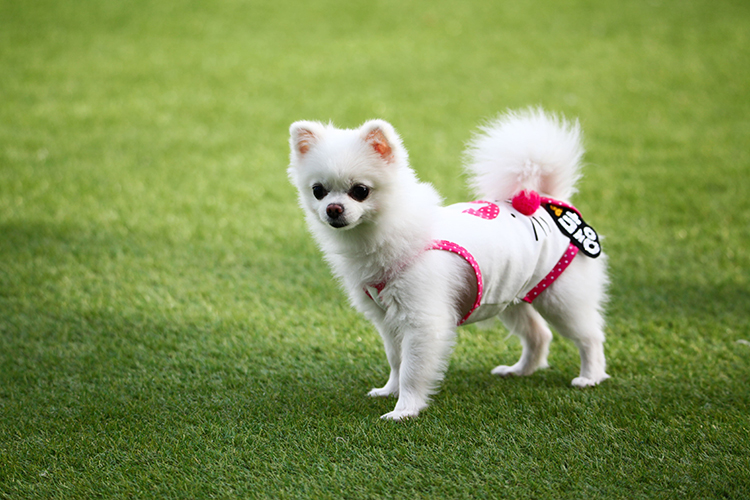For many residents in San Jose, their furry friends aren’t just pets – they’re family. That’s why ensuring their safety is paramount. One often overlooked hazard in backyards is the spread of toxic weeds. By understanding these threats and how artificial grass for dogs in San Jose can help keep them away, San Jose residents can provide a safer environment for their pups.
How Does Artificial Grass Prevent Weed Infestations?
The battle against weeds is one that many San Jose residents know all too well. However, the shift to artificial grass offers a powerful solution to keeping those pesky invaders at bay. Here’s a deep dive into the protective benefits of this innovative lawn option:
Dense Backing
Quality artificial grass is constructed with a dense, thick backing that acts as a formidable barrier against weeds. Unlike natural grass, where weeds can easily penetrate weak or thin patches, artificial grass offers consistent protection.
For example, consider trying to poke a pencil through a thick rubber mat versus a thin cloth; the dense backing of the turf acts much like that rubber mat, making it tough for weeds to break through.
No Soil Exposure
Weeds require a fertile ground for germination, specifically soil. With artificial grass for dogs in San Jose, most of the ground remains covered, ensuring that weed seeds find no spot to root.
Imagine spilling a bag of popcorn seeds on a carpet. On a regular carpet (akin to natural grass), some seeds might find their way to the floor beneath. But if the carpet is sealed underneath, those seeds have nowhere to go—much like weeds on artificial grass.
Less Maintenance and Free of Bare Patches
Natural lawns, especially in high foot traffic areas, can develop bare patches, which become breeding grounds for weeds. But artificial grass doesn’t wear out or develop such patches.
Think of a well-trodden path in a park, which turns to mud when it rains and then becomes a prime spot for weeds. With artificial grass, even the most frequented spots remain as lush and impenetrable as the day they were installed.
Pre-installation Treatment
In San Jose, before the installation of artificial grass, it’s common practice to treat the ground with weed killers to ensure a robust, weed-free base.
This step is akin to pre-treating a room for pests before sealing it off. By addressing the problem before it can even begin, homeowners get a head start in the battle against weeds.
10 Toxic Weeds for Dogs That Artificial Grass Keeps at Bay
San Jose backyards, though delightful, can sometimes harbor unseen dangers for our canine buddies in the form of toxic weeds. Many of these plants mask their threat with their innocent appearance. Thankfully, synthetic turf for pets or a residential putting green in San Jose as a barrier, warding off these harmful invaders.
1. Foxtail
Prevalent in San Jose, this weed can embed in dogs’ skin, eyes, nose, and feet. It’s not only irritating but can lead to severe infections.
2. Autumn Crocus
Consuming this weed can cause dogs to experience severe vomiting, gastrointestinal bleeding, liver and kidney damage, and respiratory failure.
3. Sago Palm
While aesthetically pleasing, ingestion can lead to symptoms like vomiting, diarrhea, and even liver failure in dogs.
4. Oleander
All parts of this plant are toxic. Consumption can lead to reduced heart rate, severe vomiting, and even death in canines.
5. Azalea
Even a few leaves can lead to oral irritation, vomiting, diarrhea, and lethargy in dogs.
6. Castor Bean
Contains ricin, a deadly toxin. Dogs consuming this can experience abdominal pain, drooling, vomiting, and even seizures.
7. Yew
Known for its bright red berries, ingestion can cause trembling, difficulty breathing, and heart failure in dogs.
8. Lupine
Some varieties contain toxins that cause nervousness, depression, and other behavioral changes in dogs.
9. Morning Glory
Seeds of certain varieties contain toxic compounds that, if consumed, can cause diarrhea, hallucinations, and agitation in dogs.
10. Daffodil
The bulb is the most toxic part. Consuming it can lead to vomiting, diarrhea, abdominal pain, arrhythmias, and even respiratory depression in canines.
Weeds, often dismissed as mere nuisances, can pose significant health threats to our pets. By opting for artificial grass in San Jose, homeowners can provide not just an aesthetic appeal to their gardens but also a safer haven for their four-legged friends.
